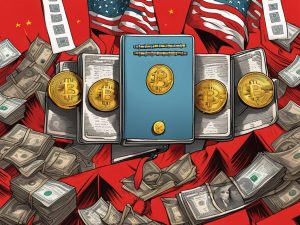Understanding the Risks of Government Subsidies for Corporations
Intel’s recent struggles highlight the dangers of relying on government welfare for corporations. In 2022, the Biden Administration passed the CHIPS and Science Act with bipartisan support, providing billions in subsidies for semiconductor manufacturing. While the intention was to compete with China’s state-backed industry, critics argue that this approach undermines innovation and stifles competition.
The Failure of Government Intervention in the Tech Industry
Despite claims that China’s centralized model poses a threat to US tech dominance, experts warn against emulating Beijing’s top-down approach. The US has a thriving tech ecosystem driven by entrepreneurs and venture capital, making government subsidies unnecessary. Intel, once a tech giant, now struggles to compete due to poor strategic decisions and missed opportunities in emerging technologies like AI.
- Intel’s missteps highlight the risks of government reliance in the tech sector
- The CHIPS Act provides billions in subsidies for semiconductor manufacturing
- Intel’s decline is attributed to poor strategic decisions and missed opportunities
- US tech industry thrives on innovation and entrepreneurship
- Government subsidies may stifle competition and innovation
- Intel’s struggles underscore the limitations of government intervention in tech
The Consequences of Government Bailouts for Corporations
Intel, once a leader in high-tech, now faces significant challenges as it competes with more agile rivals like Taiwan Semiconductor Manufacturing Company (TSMC). Despite receiving billions in government subsidies, Intel continues to struggle to keep up with industry trends and technological advancements. The failure of Intel serves as a cautionary tale for the dangers of corporate welfare and government intervention in the private sector.
The Future of Corporate Subsidies in the Tech Industry
As Intel grapples with its decline, policymakers must reassess the efficacy of government subsidies in the tech industry. While proponents argue that subsidies are necessary to compete with state-backed industries like China, critics warn that such interventions can hinder innovation and create dependencies. The next administration must carefully consider the implications of corporate welfare and prioritize a competitive and innovative tech sector.
Hot Take: Rethinking Government Subsidies for Corporations
As Intel’s struggles continue, it’s clear that government subsidies are not a panacea for the challenges facing the tech industry. The failures of Intel and other companies receiving subsidies serve as a stark reminder of the risks and limitations of government intervention in the private sector. Moving forward, policymakers must prioritize competition, innovation, and entrepreneurship over reliance on corporate welfare to ensure a vibrant and sustainable tech industry.





 By
By
 By
By
 By
By

 By
By
 By
By